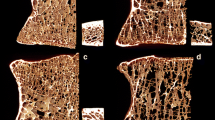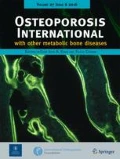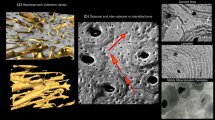Abstract
Introduction
A recently developed method allows investigating trabecular bone on an elemental (rod/plate) level. With this method, it is possible to measure local morphometric parameters such as thickness or orientation directly on the extracted rods and plates. Age-related changes of trabecular microarchitecture can thus be investigated on an elemental level, which may help to improve the understanding of age-related bone failure mechanism as well as the effect of pharmaceutical intervention in the prevention of such fractures.
Methods
Autopsies from femoral heads (FH) and lumbar spine (LS) were analyzed by global morphometry. Additionally, the trabecular structures were decomposed into rods and plates for the analysis with local morphometry. These morphometric indices were related to age using an analysis of covariance to test for gender differences and linearity with age.
Results
In this study, age-related changes showed no gender but site differences. In LS, rods were thinned in aging and finally vanish from the structure, causing a transformation of the trabecular bone structure to longer and, on average, thicker rods. In FH, changes were expressed by a simultaneous thinning and loss of interconnecting trabeculae and perforation of plates leading to new plates and rods. Results were mostly in agreement with earlier findings using descriptive analysis of the aging process.
Conclusion
Here we present for the first time preliminary quantitative evidence of changes in the local microstructure, i.e., individual rods and plates. Nevertheless, the number of samples was too small to make for ready conclusions. We conclude that the combination of local and global morphometry is a useful method for a detailed and quantitative description of age-related changes in bone microstructure.




Similar content being viewed by others

References
Beck JS, Nordin BE (1960) Histological assessment of osteoporosis by iliac crest biopsy. J Pathol Bacteriol 80:391–397
Caldwell RA (1962) Observations on the incidence, aetiology, and pathology of senile osteoporosis. J Clin Pathol 15:421–431
Lindahl O, Lindgren AG (1962) Grading of osteoporosis in autopsy specimens. A new method. Acta Orthop Scand 32:85–100
Riggs BL (1991) Overview of osteoporosis. West J Med 154(1):63–77
Consensus development conference (1991) Prophylaxis and treatment of osteoporosis (1991). Am J Med 90(1):107–110
Consensus development conference (1993) Diagnosis, prophylaxis, and treatment of osteoporosis. Am J Med 94(6):646–650
Consensus Development Conference (2000) Osteoporosis prevention, diagnosis, and therapy. NIH consensus statement 17(1):1–45
Trotter M, Broman GE, Peterson RR (1960) Densities of bones of white and Negro skeletons. Am J Orthop 42–A:50–58
Bromley RG, Dockum NL, Arnold JS, Jee WS (1966) Quantitative histological study of human lumbar vertebrae. J Gerontol 21(4):537–543
Chalmers J, Weaver JK (1966) Cancellous bone: its strength and changes with aging and an evaluation of some methods for measuring its mineral content. II. An evaluation of some methods for measuring osteoporosis. J Bone Joint Surg Am 48(2):299–308
Dunnill MS, Anderson JA, Whitehead R (1967) Quantitative histological studies on age changes in bone. J Pathol Bacteriol 94(2):275–291
Wakamatsu E, Sissons HA (1969) The cancellous bone of the iliac crest. Calcif Tissue Res 4(2):147–61
Ellis HA, Peart KM (1972) Quantitative observations on mineralized and non-mineralized bone in the iliac crest. J Clin Pathol 25(4):277–86
Arnold JS, Wei LT (1972) Quantitative morphology of vertebral trabecular bone. In: Stover B, Jee WS (eds) Radiobiology of plutonium, JW Press, Salt Lake City, pp 333–354
Merz WA, Schenk RK (1970) Quantitative structural analysis of human cancellous bone. Acta Anat (Basel) 75(1):54–66
Melsen F, Melsen B, Mosekilde L, Bergmann S (1978) Histomorphometric analysis of normal bone from the iliac crest. Acta Pathol Microbiol Scand, A 86(1):70–81
Vedi S, Compston JE, Webb A, Tighe JR (1982) Histomorphometric analysis of bone biopsies from the iliac crest of normal British subjects. Metab Bone Dis Relat Res 4(4):231–236
Atkinson PJ (1967) Variation in trabecular structure of vertebrae with age. Calcif Tissue Res 1(1):24–32
Carter DR, Hayes WC (1977) The compressive behavior of bone as a two-phase porous structure. J Bone Joint Surg Am 59(7):954–962
Rice JC, Cowin SC, Bowman JA (1988) On the dependence of the elasticity and strength of cancellous bone on apparent density. J Biomech 21(2):155–168
Hui SL, Slemenda CW, Johnston CC, Jr (1988) Age and bone mass as predictors of fracture in a prospective study. J Clin Invest 81(6):1804–1809
Parfitt AM, Mathews CH, Villanueva AR, Kleerekoper M, Frame B, Rao DS (1983) Relationships between surface, volume, and thickness of iliac trabecular bone in aging and in osteoporosis. Implications for the microanatomic and cellular mechanisms of bone loss. J Clin Invest 72(4):1396–1409
Kleerekoper M, Villanueva AR, Stanciu J, Rao DS, Parfitt AM (1985) The role of three-dimensional trabecular microstructure in the pathogenesis of vertebral compression fractures. Calcif Tissue Int 37(6):594–597
Parfitt AM (1984) Age-related structural changes in trabecular and cortical bone: cellular mechanisms and biomechanical consequences. Calcif Tissue Int 36 (Suppl 1):S123–8
Mosekilde L (1988) Age-related changes in vertebral trabecular bone architecture-assessed by a new method. Bone 9(4):247–250
Mosekilde L (1989) Sex differences in age-related loss of vertebral trabecular bone mass and structure-biomechanical consequences. Bone 10(6):425–432
Thomsen JS, Ebbesen EN, Mosekilde LI (2002) Age-related differences between thinning of horizontal and vertical trabeculae in human lumbar bone as assessed by a new computerized method. Bone 31(1):136–142
Bergot C, Laval-Jeantet AM, Preteux F, Meunier A (1988) Measurement of anisotropic vertebral trabecular bone loss during aging by quantitative image analysis. Calcif Tissue Int 43(3):143–149
McCalden RW, McGeough JA, Court–Brown CM (1997) Age-related changes in the compressive strength of cancellous bone. The relative importance of changes in density and trabecular architecture. J Bone Joint Surg Am 79(3):421–427
Weinstein RS, Hutson MS (1987) Decreased trabecular width and increased trabecular spacing contribute to bone loss with aging. Bone 8(3):137–142
Rüegsegger P, Koller B, Müller R (1996) A microtomographic system for the nondestructive evaluation of bone architecture. Calcif Tissue Int 58(1):24–29
Müller R, Hildebrand T, Rüegsegger P (1994) Non-invasive bone biopsy: a new method to analyse and display the three-dimensional structure of trabecular bone. Phys Med Biol 39(1):145–164
Müller R (2002) The Zürich experience: one decade of three–dimensional high–resolution computed tomography. Top Magn Reson Imaging 13(5):307–322
Wehrli FW, Saha PK, Gomberg BR, Song HK, Snyder PJ, Benito M, Wright A, Weening R (2002) Role of magnetic resonance for assessing structure and function of trabecular bone. Top Magn Reson Imaging 13(5):335–355
Majumdar S (1998) A review of magnetic resonance (MR) imaging of trabecular bone micro-architecture: contribution to the prediction of biomechanical properties and fracture prevalence. Technol Health Care 6(5–6):321–327
Majumdar S (2002) Magnetic resonance imaging of trabecular bone structure. Top Magn Reson Imaging 13(5):323–334
Hildebrand T, Rüegsegger P (1997) A new method for the model-independent assessment of thickness in three-dimensional images. J Microsc 185:67–75
Hildebrand T, Rüegsegger P (1997) Quantification of bone microarchitecture with the structure model index. Comput Methods Biomech Biomed Eng 1(1):15–23
Jinnai H, Watashiba H, Kajihara T, Nishikawa Y, Takahashi M, Ito M (2002) Surface curvatures of trabecular bone microarchitecture. Bone 30(1):191–194
Odgaard A, Gundersen HJ (1993) Quantification of connectivity in cancellous bone, with special emphasis on 3–D reconstructions. Bone 14(2):173–182
Ding M (2000) Age variations in the properties of human tibial trabecular bone and cartilage. Acta Orthop Scand 292:1–45
Ding M, Odgaard A, Linde F, Hvid I (2002) Age-related variations in the microstructure of human tibial cancellous bone. J Orthop Res 20(3):615–621
Kinney JH, Ladd AJ (1998) The relationship between three-dimensional connectivity and the elastic properties of trabecular bone. J Bone Miner Res 13(5):839–845
Stauber M, Nazarian A, Müller R (2002) Element based morphometric characterization of trabecular bone. Trans Europ Orthop Res Soc 12, pp O89
Stauber M, Rapillard L, Zysset PK, Müller R (2003) Element based morphometry – a new tool for the assessment of mechano–structure relationships in trabecular bone. Trans Orthop Res Soc 28:109 New Orleans
Stauber M, Müller R (2006) Volumetric spatial decomposition of trabecular bone into rods and plates – A new method for local bone morphometry. Bone in press
Hildebrand T, Laib A, Müller R, Dequeker J, Rüegsegger P (1999) Direct three-dimensional morphometric analysis of human cancellous bone: microstructural data from spine, femur, iliac crest, and calcaneus. J Bone Miner Res 14(7):1167–1174
Dequeker J (1994) Assessment of quality of bone in osteoporosis–BIOMED I: fundamental study of relevant bone. Clin Rheumatol 13 (Suppl 1):7–12
Melton LJ, 3rd (2000) Who has osteoporosis? A conflict between clinical and public health perspectives. J Bone Miner Res 15(12):2309–2314
Cummings SR, Melton LJ (2002) Epidemiology and outcomes of osteoporotic fractures. Lancet 359(9319):1761–1767
Aerssens J, Boonen S, Joly J, Dequeker J (1997) Variations in trabecular bone composition with anatomical site and age: potential implications for bone quality assessment. J Endocrinol 155(3):411–421
Dequeker J, Boonen S, Breemans S (1995) Assessment of quality of bone in osteoporosis: clinical characteristics of patient material. Clin Rheumatol 14:596
Müller R, Rüegsegger P (1997) Micro-tomographic imaging for the nondestructive evaluation of trabecular bone architecture. Stud Health Technol Inform 40:61–79
Hahn M, Vogel M, Pompesius-Kempa M, Delling G (1992) Trabecular bone pattern factor–a new parameter for simple quantification of bone microarchitecture. Bone 13(4):327–330
Bernard TM, Manzanera A (1999) Improved Low Complexity Fully Parallel Thinning Algorithm 10th International Conference on Image Analysis and Processing (ICIAP '99), Venice, Italy
Manzanera A, Bernard TM, Prêteux F, Longuet B (1999) Medial faces from a concise 3D thinning algorithm International Conference on Computer Vision (ICCV '99), Kerkyra, Greece, pp 337–343
Saha PK, Chaudhuri BB (1996) 3D digital topology under binary transformation with applications. Comput Vis Image Underst 63(3):418–429
Cleveland WS (1979) Robust locally weighted regression and smoothing scatterplots. J Am Stat Assoc 74(368):829–836
Cleveland WS (1981) Lowess – a program for smoothing scatterplots by robust locally weighted regression. Am Stat 35(1):54–54
Ding M, Hvid I (2000) Quantification of age-related changes in the structure model type and trabecular thickness of human tibial cancellous bone. Bone 26(3):291–295
Cummings SR, Black DM, Nevitt MC, Browner WS, Cauley JA, Genant HK, Mascioli SR, Scott JC, Seeley DG, Steiger P, et al. (1990) Appendicular bone density and age predict hip fracture in women. The Study of Osteoporotic Fractures Research Group. JAMA 263(5):665–668
Riggs BL, Melton Iii LJ, Robb RA, Camp JJ, Atkinson EJ, Peterson JM, Rouleau PA, McCollough CH, Bouxsein ML, Khosla S (2004) Population-based study of age and sex differences in bone volumetric density, size, geometry, and structure at different skeletal sites. J Bone Miner Res 19(12):1945–1954
Parfitt AM (1989) Plasma calcium control at quiescent bone surfaces: a new approach to the homeostatic function of bone lining cells. Bone 10(2):87–88
Müller R (2005) Long-term prediction of three-dimensional bone architecture in simulations of pre-, peri- and post-menopausal microstructural bone remodeling. Osteoporos Int 16 (Suppl 2):S25–S35
Hayes WC, Carter DR (1976) Postyield behavior of subchondral trabecular bone. J Biomed Mater Res 10(4):537–544
Turner CH (1989) Yield behavior of bovine cancellous bone. J Biomech Eng 111(3):256–260
Michel MC, Guo XD, Gibson LJ, McMahon TA, Hayes WC (1993) Compressive fatigue behavior of bovine trabecular bone. J Biomech 26(4–5):453–463
Müller R, Gerber SC, Hayes WC (1998) Micro-compression: a novel technique for the nondestructive assessment of local bone failure. Technol Health Care 6(5–6):433–444
Nazarian A, Müller R (2004) Time-lapsed microstructural imaging of bone failure behavior. J Biomech 37(1):55–65
Gibson LJ (2005) Biomechanics of cellular solids. J Biomech 38(3):377–399
Acknowledgements
This study was partly supported by the SNF Professorship in Bioengineering of the Swiss National Science Foundation (FP 620–58097.99 and PP–104317/1) and the European Union BIOMED I concerted action “Assessment of Bone Quality in Osteoporosis”. We would also like to thank Dr. H.R. Roth for statistical advice.
Author information
Authors and Affiliations
Corresponding author
Rights and permissions
About this article
Cite this article
Stauber, M., Müller, R. Age-related changes in trabecular bone microstructures: global and local morphometry. Osteoporos Int 17, 616–626 (2006). https://doi.org/10.1007/s00198-005-0025-6
Received:
Accepted:
Published:
Issue Date:
DOI: https://doi.org/10.1007/s00198-005-0025-6



